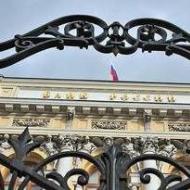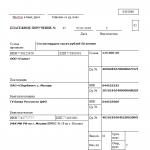
What is included in the budgeting process. Budgetary process: concept, stages of the budgetary process and their brief description. Public Debt Management Techniques
The budgetary process is the activity of state authorities, local governments and participants in the budgetary process, regulated by the norms of law, in the preparation and consideration of draft budgets, draft budgets of state extra-budgetary funds, approval and execution of budgets and budgets of state extra-budgetary funds, as well as control over their execution.
It includes four stages of budgetary activity:
- drafting budgets;
- consideration and approval of budgets;
- execution of budgets;
- preparation of reports on the execution of budgets and their approval.
Participants of the budget process in the Russian Federation
Participants in the budget process are the subjects of budgetary sphere management and recipients of budgetary funds determined by the current legislation that are related to the development of the project, consideration, approval of the law (decision) on the budget for the next year, as well as to its implementation and control over the execution process from the standpoint of the norms of the current budget legislation.
The RF Budget Code defines the following participants in the budget process:
President of the Russian Federation. The President addresses the Federal Assembly with a Budget Address. A procedure has been established according to which the said message must be sent to the relevant authorities no later than March of the year preceding the budgetary one. The budget message of the President of the Russian Federation is defined as an official document stipulated by the Constitution of the Russian Federation and the Budget Code of the Russian Federation, sent to the chambers of parliament and the Government of the Russian Federation, outlining the main tasks and priorities of the state budgetary policy for the next budget year. The President, as a participant in the budgetary process, actually determines the priorities of budgetary policy. At the same time, the proposals of other participants in the budget process - the government, the Accounts Chamber of the Russian Federation and other bodies - are carefully studied. As a participant in the budgetary process, the President of the country in the last instance signs laws on the federal budget for the next year, federal laws on the budgets of state extra-budgetary funds, as well as laws on budget execution.
Federal Assembly of the Russian Federation (parliament), i.e. its both chambers - the State Duma and the Federation Council, as well as local legislative (representative) authorities. The country's parliament and local legislative (representative) authorities adopt (approve) the budgets of the corresponding levels, as well as laws (decisions) on budget execution. It is in this area that public financial management really manifests itself, the content of which is an open detailed discussion of all budget parameters from the point of view of their compliance with expenditure obligations and the main priorities of budget policy, regulation of significant flows of financial resources exceeding a third of GDP - by approving the budget for revenues and expenditures ...
Government of the Russian Federation. governments of the subjects of the Federation, local executive authorities responsible for the development and implementation of budgets. The Government of the Russian Federation, in particular, in accordance with the Constitution of the Russian Federation and the Federal Constitutional Law "On the Government of the Russian Federation" acts as the body responsible for concretizing budgetary policy in the draft law on the budget for the next goal. It manages the ministries and departments responsible for budgeting and execution. The role of local executive authorities is similar.
Ministries and departments responsible for the development of the draft budget, departments that are subjects of budget planning, as well as relevant local authorities. A special place among the ministries is occupied by the Ministry of Economic Development of the Russian Federation, which is responsible for the development of macroeconomic forecasts, as well as the Ministry of Finance of the Russian Federation, which, on behalf and on behalf of the Government of the Russian Federation, develops a draft law on the budget and prepares proposals for the Government of the Russian Federation to amend budget legislation. The government is the subject of the right to legislative initiative.
Bodies administering budget execution but revenues. In Russia, such bodies are defined by the Budget Code of the Russian Federation, according to which each type of income has an administrator assigned to it, who is responsible for the timeliness and completeness of receipts to the budget, as well as for the return of excessively transferred to the budget income.
The Federal Treasury and its local bodies that carry out cash execution of the budget. These are the most active participants in the budget process, not only involved in budget execution, but also responsible for drawing up reports on budget execution and developing recommendations arising from the results of budget execution.
Bodies providing banking services for budget execution - the Central Bank (Bank of Russia) and its local structures. In exceptional cases, the execution of the budget by commercial banks is allowed, which was the norm in the period when there were no such restrictions. But the so-called authorized banks in the 90s actively used budget funds in their own interests, delaying their entry into the budget sector. This negative trend was gradually overcome.
The main managers, administrators and recipients of budgetary funds, constituting the organizational unity of the budgetary sphere. It is in their addresses that budgetary funds are transferred to bank accounts. Therefore, they are responsible for the legality, targeted and effective use of budget funds.
The Accounts Chamber of the Russian Federation, control and accounting bodies of the constituent entities of the Federation that carry out preliminary, subsequent and current financial control, including in the form of an examination of the quality of the development and execution of the budget. They exercise financial control over the legality, targeted and effective use of budget funds.
Other bodies receiving budget funds to fulfill orders in the interests of the development of the budgetary sphere. As an example, we can name large commercial organizations that supply goods to the budgetary sphere, perform work and provide services on the basis of government orders and concluded contracts and, in this regard, receive large amounts of budget funds.
Stages of the budgetary process in the Russian Federation
Consistent implementation of the budgeting process occurs in stages. These stages are usually called stages. At the federal level, the budget process covers the following stages:
- Development of the draft budget (by the Ministry of Finance) in accordance with the decree of the Government of the Russian Federation.
- Submission of the draft budget for consideration and consideration.
- Approval of the draft budget.
- Execution of the budget for income and expenses.
- Consideration and approval of the law on budget execution.
- A certain cyclical nature of the budget process is obvious.
Its full cycle begins with the Budget Address of the President of the Russian Federation and ends with the adoption of a law on budget execution. From the beginning of the next year to the end of the year, a draft budget law is developed, submitted for consideration, reviewed and approved. The budget is being executed for the next year. And one more year is practically spent on the preparation, consideration and approval of the budget execution report, which is adopted in the form of a law some time after the adoption of the law on the budget for the next year. For example, the draft law on the federal budget for 2011 was drawn up from the beginning of 2010 and was supposed to be adopted by the end of the year. According to the prevailing
the practice of submitting a draft law on budget execution for 2010 to parliament, the report should have been submitted to parliament no later than June 2011 (in fact, it is submitted annually with a delay - along with the draft law for the next year), and it can be adopted only at the end of the year ... Thus, the budget cycle lasts about three years.
The development of the draft federal budget is associated with budget planning. The main contours of this process are schematically shown in Fig. 1.
The main procedures of the public budget process provided for in the RF Budget Code are defined as budget readings. Through 2005, the budgets were adopted according to the previously approved scheme - within the framework of four budget readings. On May 22, 2004, the Government of the Russian Federation adopted Resolution No. 249 "On Measures to Improve the Effectiveness of Budget Spending", which approved the Concept of Reforming the Budgetary Process, providing for three budget readings. In the process of budget reform (2004-2006), a transition to the practice of three budget readings was to take place (in connection with the division of budget expenditures into established and newly adopted ones, which implies the obligatory inclusion in budget expenditures of funding volumes arising from the amounts established by the registers of expenditure obligations ). Obviously, the reduction in the number of budget readings (three instead of four) is due to the fact that since 2005 budget expenditures have been divided into established and newly adopted ones, and therefore there is no need for discussions on expenditures, which are enshrined in regulatory legal acts and are subject to funding.
However, the federal budget for 2007 and subsequent years was adopted using the “zero” reading procedure (the draft was discussed in the Government of the Russian Federation with the participation of members of the Federation Council and deputies of the State Duma).
Figure: 1. Development of the draft law on the federal budget
After the draft law on the federal budget has been submitted to the parliament and adopted for consideration in the first reading (lasting 30 days), the concept of the draft law on the budget is adopted and approved (or not approved). The concept of the budget is a fundamental model of the draft budget for the next year as a reflection of the main priorities of the budgetary policy of the state (respectively, the Russian Federation and the constituent entities of the Russian Federation) and municipalities. The budget concept is formed in strict accordance with the RF Budget Code, which defines the range of problems that are reflected in the draft budget law, i.e. the format of the law on the budget has been established in line with the implementation of the budget policy guidelines:
- the volume, composition and structure of federal budget revenues and expenditures in accordance with the budget classification, as well as their ratio to GDP;
- absence or presence of budget deficit (surplus) and its volume;
- sources of covering the deficit, including internal and external, which means the volume of internal and external borrowing to cover the deficit;
- limit volumes of public internal and external debt at the end of the fiscal year;
- investment orientation of budget expenditures and structural changes in budget revenues and expenditures by sections of the functional classification;
- the volume of interbudgetary transfers and the principles of providing financial assistance to the regions.
Situations are possible when, after the introduction of the draft law on the federal budget for the next year, opportunities are sought to obtain additional income. Costs are adjusted accordingly. An example can be the budget for 2011, the initially determined and finally formed parameters of which are presented in table. 1.
Table 1. Changes in budget indicators in the 2010 budget process, billion rubles.
|
Federal budget for 2011 |
|||
|
On the draft budget law |
Approved by the budget law |
||
* Proposed reimbursement of expenses of the Ministry of Emergencies. related to the financing of measures to combat fires in the summer of 2010 (about 10.7 billion rubles); an increase in expenses for the section “National Economy - for transport construction in connection with the Olympic Games in Sochi - 37.4 billion rubles.
** Federal budget revenues for 2011 were approved as forecasted at an inflation rate of 6.5% and a GDP volume of 50,389 billion rubles.
Source: Federal Law of December 13, 2010 No. 357-FE-On the federal budget for 2011 and for the planning period of 2012 and 2013 ”.
During first reading the unacceptability of the budget concept may be the basis for rejecting the draft budget and returning it to the RF Government for revision. It is possible to raise the issue of confidence in the Government of the Russian Federation.
It is very important that the main provisions of the previous budget reading are not revised in the future, but only detailed. Naturally, during second reading within the framework of the total amount of budget expenditures approved in the first reading, the directions for spending budget funds by sections of the functional classification are approved, the size of the fund for financial support of the constituent entities of the Federation is approved, and numerous amendments are adopted by items of expenditure.
Before making changes to the Budget Code of the Russian Federation within the framework of third reading the directions of spending funds by subsections of the functional classification were detailed, the programs of internal and external borrowing, the main indicators of the state defense order, the Federal Targeted Investment Program, the list of legislative acts, the norms of which are canceled or suspended for the next year, were considered and approved, since the budget does not provide funds for them implementation.
AT fourth reading the law on the budget was to be adopted as a whole - taking into account the linguistic expertise and "removal" of possible contradictions in its content.
In the current procedure for the consideration and adoption of the budget law in three readings, the main procedures of the previous second and third readings are practically combined. In accordance with Art. 201-207 B K RF in first reading I approve the main characteristics of the draft budget and the conditionally approved expenditures by sections, subsections, target items and types of budget expenditures. At the same time, it is not allowed to change the volume of budget revenues and expenditures without a corresponding conclusion of the RF Government. But the project can be rejected and returned for revision with the appropriate continuation of work on the draft Conciliation Commission - according to the recommendations of the State Duma committees, taking into account the conclusion of the Federation Council.
Second reading (after amending the Budget Code and reducing the number of readings from four to three) all annexes to the draft budget are considered and approved, which define the lists of the chief administrators of budget revenues, chief administrators of sources of financing the deficit, expenditures by sections, subsections, target items and types budget expenses, which are considered to be functional expenses (except for conditionally approved expenses that were approved in the first reading) - within the total amount of expenses approved in the first reading. At this stage, programs of state internal and external borrowing, a program for providing state guarantees, and expenditures for long-term targeted programs are approved.
According to Federal Law No. 58-FZ of April 9, 2009 "On Amendments to the Budget Code of the Russian Federation and Certain Legislative Acts of the Russian Federation", it was envisaged to approve at this stage the volume of interbudgetary transfers to state extra-budgetary funds within the total budget expenditures.
In the third reading taking into account the results of the first and second readings, the departmental structure of budget expenditures is considered and approved - with appropriate amendments. The law on the budget for the next year and for the planning period is adopted as a whole and sent to the Federation Council for consideration, and then to the RF President for consideration. Article 210 of the RF BC provides for the possibility of rejecting the law by the RF President. In this case, he is sent to the conciliation commission with the obligatory participation of a representative of the President of the Russian Federation.
Changes to the procedure for conducting budgetary readings will shorten this process by a month and have an approved budget a month before the start of the budget year. At the first stage of work in the new regime, which coincided with the financial crisis, the “acceleration” of the budget process was associated with negative consequences. In a crisis, it is extremely difficult to make a forecast on which all budget calculations are based. This resulted in insufficient justification of the project with all the flaws of "acceleration".
As already noted, a new phenomenon in the Russian practice of the budgetary process, starting in 2006, was the discussion of the draft law on the federal budget in the framework of the "zero" reading - before the draft law was submitted to the parliament for consideration in order to more balanced consideration of the proposals of the deputies at the stage of work on the draft law on budget.
Zero reading is not provided for by the RF Budget Code. It is practiced primarily in connection with miscalculations in the development of macroeconomic forecasts and the corresponding understatement of revenues and expenditures in the draft budget for the next year. Within the framework of the "zero" reading, as a rule, the reserves for increasing budget expenditures not taken into account in the preparation of the draft budget are revealed. In particular, during the discussion of the draft budget for 2007 in August 2006, the expenditure budget was adjusted upward by 50 billion rubles. Note that ultimately they amounted to 5463.5 billion rubles. The refinement was less than 1% of the costs. Obviously, this practice does not fully justify itself. At the same time, "zero" reading is one of the forms of popularization of the activities of the faction in parliament that has a majority. Usually, the results of the discussion of the draft budget law are presented as a merit of the dominant faction, which presents amendments to the draft budget as evidence of concern for the voters. The role of the faction seems to be the more significant, the more proposals the government takes into account in the framework of the zero reading.
As a result of the completion of the budget reform and a real reduction in the number of budget readings to three, the budget process in Russia formally has much in common with the budget process in Germany, where three readings are also practiced.
The first reading takes place in the form of a meeting of rapporteurs, who are representatives of the parliamentary budget committee (Bundestag) who are responsible for certain areas of work. At this stage, the main issues of consensus between the government party and the opposition are resolved. Presenters and co-presenters formulate written proposals that must be taken into account. The agreed positions are discussed in a plenary session, at which the draft budget law and budget plan are formally approved.
In the second reading, taking into account all the discussions at the meetings of the budget committee and the meeting of the chancellor with the opposition leaders, one and the other draft can be specified.
Within the framework of the third reading, the final text of the budget law is adopted as the basis for approving the budget plan. Not a single norm of the latter, which has financial implications, is not adopted without government approval, which reduces the activity of MPs in imposing previously unfinanced expenses on the government. After the adoption of the budget law, it is sent to the Bundesrat, which is not obliged to officially approve it, but has the right to veto if it finds any problematic issues. In this case, a conciliation commission is created from representatives of the government, the Bundestag and the Bundesrat, which makes a decision on amending the law. The constitutional foundations of financial and budgetary regulation are quite fully presented in Art. 104a-115 of the Basic Law. The main provisions on the budgetary structure and the budgetary process are presented in the Regulations on the federal budget of August 19, 1969, with subsequent significant changes taking into account the realities of the unification of West and East Germany, which required a radical reorganization of interbudgetary transfers to depressed territories. By the way, these turned out to be the lands of the former GDR, on the territory of which, during the period of transformation processes, the volume of production dropped sharply, mass unemployment and a sharp decline in living standards became a reality. In Germany, as in Russia, the transformation process has significantly increased social stratification. That is why the budgetary process, as in Russia, is sharply politicized and socially tense, since the deputies of parliament from depressed lands have to strive to correct the share of the corresponding territory in the budget in extreme polemics.
With the help of legal norms, the state carefully regulates the relations arising from the formation of all types of budgets to reporting on their execution, establishes the procedure and sequence of actions of participants in budgetary legal relations. It is the procedural norms of budget law that establish the procedure for the state to receive revenues, their distribution between different budgets and use for the implementation of tasks and functions by the state and local government.
Traditionally, the budget process is defined as a set of actions of authorized state and local government bodies for the preparation, consideration, approval and execution of budgets, as well as the preparation, consideration and approval of a report on their implementation, carried out on the basis of the norms of budget law. With this in mind, in a broad sense, the budgetary process is a power-based activity of the relevant authorities, subject to strict budgetary procedures. In Art. 2 of the Budget Code of Ukraine gives a slightly different definition budget process - this is the process of drawing up, reviewing, approving, executing budgets, reporting on their implementation, as well as monitoring compliance with budgetary legislation, regulated by budget legislation.
This activity is cyclical and periodic. Budget cycle, unlike the budget period, which is equal to a calendar year, it contains the time interval from the beginning of the formation of the budget for the year, which is planned, until the approval of the report on its implementation. So, the budget cycle includes:
1) the period of budget formation;
2) the period of budget execution;
3) preferential budgetary terms (the duration of last year's capital investment allocations);
4) reporting period.
Now in Ukraine, the budget cycle is about 2.5 years.
The budget process consists of appropriate stages are determined by the content and nature of the activities of state bodies, as a result of which such activities acquire new qualities.
Traditionally, there are five stages in the budget process:
1) development and preparation of a draft budget;
2) consideration of the draft budget;
3) approval of the draft budget;
4) budget execution;
5) drawing up, consideration and approval of the budget execution report.
The allocation of such stages is determined by logic, since they cover all the activities of state bodies, starting from the awareness of the need to carry out expenses for the corresponding needs, their forecasting, the finding of income sources to cover them, and the like. Despite the fact that each of the stages is relatively independent, successively changing each other, such stages are interrelated and interrelated. The delimitation of the stages of the budgetary process contributes to the effectiveness of the legal regulation of budgetary relations
But in Art. 19 of the Budget Code of Ukraine fixes four stages of the budget process, namely:
1) drawing up draft budgets;
2) consideration of the draft and adoption of the law on the State budget, decisions on local budgets;
3) execution of the budget, including amendments to the law on the State Budget of Ukraine, decisions on local budgets;
4) preparation and consideration of a report on the implementation of the budget and making a decision on it.
All budgets that make up the budgetary system of Ukraine go through such stages: the State budget and local budgets. Based on the fact that the source of formation of all budgets is the national income of the country, which is dynamic in nature and depends on the development of the economy and is calculated, as a rule, annually, the legislative and executive bodies involved in the preparation, approval and execution of budgets, each time anew, periodically and systematically update the state of relations, the amount of his income and expenses. All stages of the budget process are carefully regulated by procedural rules of budget law, which ensures clear planning and adherence to budget discipline. Moreover, these stages follow exactly sequentially, one after the other, and their order can in no case be changed. In addition, each of the stages of the budget process, in turn, also consists of several stages, which are also mandatory.
At each stage of the budget process, issues are resolved that cannot be considered at other times. For example, the issue of providing interbudgetary transfers, fixing the percentage deductions from national taxes and fees are decided at the stage of budgeting, and finally approved at the stage of adopting the law on the State Budget. The opening and implementation of budgetary appropriations are carried out at the stage of budget execution and only after its approval, and the like.
The budget process is based on appropriate legal principles, principles that guarantee clear and impartial planning, effective use of funds, compliance with financial (budgetary) discipline and continuous monitoring of budget execution and reflect important features of the budget. Such principles are principles inherent in both budget the system of Ukraine in general, and only the budgetary process.The first group includes the principles enshrined in Article 7 of the Budget Code, namely: the unity of the budgetary system of Ukraine, balance, independence, completeness, publicity and transparency, etc.
The second group includes principles inherent only to the budget process:
1) the principle of the distribution of budgetary powers between the bodies of representative and executive power. Thus, the legislation establishes such a distribution of powers by stages of the budget process: the formation and execution of the budget is referred to the competence of the executive bodies, and the consideration, approval and control over the execution of the budget - to the competence of the representative bodies;
2) the principle of specialization of budget indicators. It is implemented through the budget classification, which, in accordance with Art. 8 of the Budget Code of Ukraine, fixing an exhaustive list of budget revenues and expenditures, consists in specifying revenues by sources, and expenditures by target areas;
3) the principle of the budgetary principle, that is, the mandatory adoption of the budget of each year before the beginning of the planned year, which makes it possible to identify trends in the country's development, to study changes in the rate of production growth. It is very important to adopt the State budget before the onset of the planned year, since this provides for and ensures the timely concentration of financial resources in the budget and financing the needs of the state and society.
In addition, it should be noted on the following principles: publicity, which presupposes a broad discussion of the draft budget, bringing it to the attention of the population, promulgation of the approved budget; visibility is the display of budget indicators in conjunction with the economic indicators of Ukraine's development; reliability, which implies the use of its real indicators in the formation of the budget, and the like; sequence of entry into budgetary activities of state bodies.
All stages of the budget process are under the control of the Accounts Chamber, which acts on behalf of the Verkhovna Rada of Ukraine and local authorities, which strengthens the financial discipline of participants in budgetary activities.
- Earlier, the Law of Ukraine of July 29, 1995 "On the budget system in Ukraine" fixed exactly such stages of the budget process.
Reporting and control. The general system of the budgetary process is shown in Fig. 3.1.
Budget process is a complex multidimensional mechanism of social and economic activity of individuals, legal entities and the state. The content of the budgetary process is based on the principles of budgetary structure and budgetary rights of various levels of government.
Budget process sequentially includes the following stages of budgetary activity:
- formation of the draft budget;
- budget consideration;
- budget execution;
- preparation, external review, review and approval of budgetary reporting.
According to the current legislation, the management of the formation and execution of budgets is the function of the executive authorities, and the consideration and approval is the function of the representative bodies. These processes are carried out in close cooperation between both branches of government. Control over the execution of budgets falls to a greater extent on the executive bodies. The main provisions for the preparation, consideration, approval and execution of the federal budget are established by the Federal Assembly of the Russian Federation, and the specific deadlines and forms of budget reporting are established by the Ministry of Finance of the Russian Federation.
The main tasks of the budgetary process include: accumulation of revenues of the state and municipalities; financing the functions of the state and municipalities; identification of material and financial reserves of the state; calculation of budget revenues and expenditures as close as possible to reality; ensuring the maximum balance of budgets; coordination of budgets with the economic program being implemented, as well as the implementation of budget regulation in order to redistribute sources of income between budgets of different levels, sectors of the economy, economic regions, etc.
Over time, the budgetary process develops from top to bottom, from the federal budget to local ones. Such a system is due to the variety of forms of ownership, the impossibility of the planned development of the national economy, as well as the nature of the formation of fixed and regulatory incomes, grants and subventions.
The duration of the budgetary process in relation to the federal budget of the Russian Federation (from the Message of the President of the Russian Federation to the Federal Law on Budget Execution) was about three years: formation, consideration and approval - 10 months, execution - one year, preparation and approval of a report on budget execution - up to one year ... This period in the scientific literature is called the budget cycle. In connection with the transition to three-year budget planning, the total duration of the budget process is increased by two years to 4.5-5 years. The duration of the budget period of territorial budgets, as a rule, is shorter.
The budgeting process proceeds strictly sequentially in time. This is due to the fact that at each of its stages it is possible to resolve only those issues that are not necessary to be raised in the future, therefore, it is not possible to change the specified order of the budget process.
The budget process is based on certain principles, which allows the most effective use of state funds. In addition to the general principles of building the budgetary system of the Russian Federation, one can name such principles of the budgetary process as budget frequency, budget continuity and specialization of budget indicators.
The periodicity of the budget means that the budget must contain a mandatory annual part, adopted for a period of one year - from January 1 to December 31, and a planned one - for two years.
The continuity of the budget lies in the organic connection and dependence of budget periods, the imposition of one period on another. Thus, the budget for the next financial year is an integral part of a multi-year (usually three-year) financial document that is annually updated and shifted one year forward, which, on the one hand, ensures the predictability of the distribution of budget allocations and, on the other hand, allows according to a clear and transparent procedure, annual adjustments in accordance with the goals of public policy and the conditions for their achievement. For this purpose, since 2008, the projects of the federal budget and the budgets of state extra-budgetary funds of the Russian Federation have been drawn up and approved for a period of three years - the next financial year and the planning period.
The specialization of budget indicators means that the budgets of the budgetary system of the Russian Federation are drawn up according to a unified budget classification: with the obligatory grouping of income and expenses according to general characteristics, assignment of exact names and serial numbers to individual sections of the budget.
Despite the measures taken in recent years to improve the budget process, the main drawback remained in it - the lack of a mechanism to ensure the effectiveness of the use of budget funds, which was expressed in the following:
- the development of a medium-term financial plan for each budget cycle separately, the annual planning period of budget expenditures, the uncertainty of the volume and structure of appropriations allocated by the main managers to the administrators and recipients of budget funds, i.e. administrators of budgetary funds;
- the provision of budgetary funds based on the adjustment (indexation) of allocations of previous years in the context of low formalization of mechanisms for the redistribution of budgetary resources and the absence of clear criteria and procedures for selecting financed areas and activities in accordance with the priorities of state policy;
- the lack of clear formulations of goals and end results of the use of budget funds, as well as criteria for assessing the activities of administrators of budget funds;
- limited powers and, consequently, responsibility of administrators of budget funds in the formation and execution of the budget;
- prevalence of external control over the compliance of cash expenditures with vat indicators in the absence of procedures and methodology for internal and external control (monitoring) of the validity of planning and results of the use of budget funds;
- the absence of a system for assessing the financial result of the activities of government bodies at different levels and assigning assets and liabilities of the Russian Federation, a constituent entity of the Russian Federation or a municipality to certain government bodies and local governments;
- the protracted and cumbersome procedure for reviewing the draft budget by the representative authorities, focused on technical details to the detriment of assessing the priorities of budgetary policy and their implementation;
- unclear delineation of powers in the budget process between representative and executive authorities.
All this limited the possibilities and incentives for improving the efficiency of public finance management and reorienting the activities of administrators of budgetary funds from the development of the appropriations allocated to them to achieve final significant and measurable results.
To change the current situation, the Ministry of Finance of the Russian Federation prepared, and the Government of the Russian Federation, by Resolution No. 249 of May 22, 2004, approved the “Concept of reforming the budgetary process in the Russian Federation in 2004-2006”.
1. The main task of reforming the budgetary process is to create conditions and prerequisites for the most efficient management of public finances in accordance with the priorities of state policy.
One of the objectives of this reform is to shift the focus of the budget process from “managing budget resources (costs)” to “managing results” by increasing the accountability and autonomy of the participants in the budget process and budget administrators within clear medium-term targets.
2. In connection with the transition to "results management", the budget should be formed based on the goals and planned results of state policy. Budget allocations should be clearly linked to functions (services, types of activities), while planning them, the main attention should be paid to justifying the final results within the framework of budget programs. The independence and responsibility of administrators of budget funds is expanding. At the same time, long-term rolling limits of appropriations are established with their annual adjustment within the framework of the medium-term financial plan, the total amount of appropriations for the performance of certain functions and programs is formed, the details of the directions of use of which are carried out by the administrators of budget funds, incentives are created to optimize the use of resources.
Priority is given to internal control, responsibility for decision making is delegated to lower levels. Monitoring and subsequent external audit of finances and performance are carried out, the performance of administrators of budget funds is assessed based on the results achieved.
3. The basis of the new organization of the budgetary process should be a model of "budgeting, based on results in the framework of medium-term financial planning". Its essence is the distribution of budgetary resources between the administrators of budgetary funds and (or) the budget programs implemented by them, taking into account or in direct dependence on the achievement of specific results (provision of services) in accordance with the medium-term priorities of socio-economic policy and within the projected for the long term budgetary volumes resources.
This model also involves the creation of a system for monitoring the performance of budget expenditures, a transition to multi-year budget planning with the establishment of clear rules for changing the volume and structure of allocations and increasing the predictability of the amount of resources managed by budget administrators.
The practical implementation of the new model and the solution of the problems of reforming the budgetary process were embodied in the Federal Law of April 26, 2007 No. 63 "On Amendments and Additions to the Budget Code of the Russian Federation".
Reforming the budgetary process was carried out in the following areas:
- reforming budget classification and budgetary accounting;
- allocation of budgets for current and assumed obligations;
- improvement of medium-term financial planning;
- improving and expanding the scope of application of program-targeted methods of budget planning;
- streamlining the procedures for drawing up and reviewing the budget;
- improvement of the accounting system, budget reporting and control.
The first direction provides for the approximation of the budget classification of the Russian Federation to the requirements of international standards, taking into account changes in the structure and functions of federal executive bodies in the framework of the administrative reform, as well as the introduction of a budget accounting chart of accounts integrated with the budget classification, based on the accrual method and providing accounting of costs for functions and programs.
The second and third directions should ensure an increase in the reliability of medium-term forecasting of the amount of resources available for administrators of budget funds within the framework of the adopted budgetary constraints and priorities of state policy.
The fourth direction involves the formation and inclusion in the budget process of a procedure for assessing the effectiveness of budget expenditures, a phased transition from budget planning and financing of expenditures to budget planning, focused on achieving final socially significant and measurable results.
The fifth area involves improving the procedures for drawing up and reviewing the budget in accordance with the requirements and conditions of medium-term budget planning, based on results.
The sixth direction allows you to create an integrated system of budget reporting, its verification and control.
In accordance with the budget reform, the following new concepts are introduced into the practice of the budget process.
Expenditure obligations are the obligations of the Russian Federation, a constituent entity of the Russian Federation, a municipal formation, stipulated by law, other regulatory legal act, agreement or agreement, to provide individuals or legal entities, state authorities, local governments with funds from the corresponding budget.
The register of expenditure obligations is a collection of the specified laws, normative legal acts and contracts, agreements and (or) their individual provisions, which must be kept by the executive authorities at each level.
When forming the budget, expenditure obligations are divided into current and accepted ones, which allows:
- significantly simplify and speed up the procedure for drawing up and reviewing the budget in terms of the fulfillment of existing obligations, focusing the process of preparing and considering the budget mainly on commitments that reflect the goals and priorities of state policy;
- maintain tighter budget constraints, since the allocation of appropriations for new commitments is possible only after budgetary allocations for the fulfillment of existing commitments are made, or they are reduced or canceled in advance;
- lengthen the period and improve the reliability of medium-term budget planning due to the established rules for forecasting the volume of existing obligations (including their distribution among administrators of budget funds);
- to introduce elements of competition into the budgetary process when distributing budgetary funds among administrators of budgetary resources in order to direct them to the implementation of the most effective budget programs.
The budget of the current obligations is the amount of appropriations required for the fulfillment in the planning period of the expenditure obligations of the Russian Federation (constituent entity of the Russian Federation, municipal formation), stipulated by the current regulatory legal acts. The current obligations include, in particular:
- transfers to the population established by the regulatory legal acts of the Russian Federation (constituent entities of the Russian Federation, municipalities);
- obligations to provide (pay) state (municipal) services in accordance with the legislation of the Russian Federation;
- obligations arising from the long-term budgetary target programs of the Russian Federation (subject of the Russian Federation, municipal formation), as well as the targeted investment program of the Russian Federation (subject of the Russian Federation, municipal formation);
- repayment and (or) servicing of state (municipal) debt in accordance with the terms of attracting borrowed funds;
- obligations arising from treaties (agreements), including international ones, in force during the planned period;
- funds to be transferred in accordance with Russian legislation or established principles (practice) of budget planning to other budgets of the budget system of the Russian Federation.
Commitment budget - the amount of appropriations required to fulfill the expenditure obligations of the Russian Federation (constituent entity of the Russian Federation, municipal formation) in the planned period, stipulated by regulatory legal acts that come into force, contracts and agreements introduced or planned (proposed) to be introduced in the planning period. The obligations assumed, in particular, include:
- an increase in existing or the introduction of new types of transfers to the population;
- increase in wages, pay;
- early repayment of state (municipal) debt;
- provision (payment) of state (municipal) services in excess of the established standards (requirements of the legislation of the Russian Federation);
- an increase in comparison with previously envisaged plans of appropriations for the implementation of existing or new budget programs;
- new budgetary investments;
- provision of budget loans.
The specific composition of the budgets of existing and assumed obligations, the procedure and methodology for determining their volumes are established by the executive authorities of the corresponding level.
The main principle of budget planning is the guaranteed provision in full of existing obligations in accordance with the goals and expected results of state policy. Allocation of appropriations for new obligations can and should be carried out only in the case and within the excess of the projected budgetary resources over the estimated volume of existing obligations, which can be formed due to:
- reducing a part of existing obligations (by amending legislation, canceling earlier decisions, revising existing programs in relation to uncommitted obligations, restructuring the budget sector, etc.);
- the use of conservative (for example, below the inflation rate) methods of adjusting existing liabilities depending on the conditions of the planning period;
- outstripping the growth of budget revenues in comparison with the projected volume of existing obligations (for regional and local budgets, primarily tax and non-tax revenues).
Based on this, the volume of the budget of the current obligations cannot exceed the planned volume of income and the balance of sources to cover the deficit of the corresponding budget under the conservative scenario of the socio-economic forecast for the corresponding year, the conditions (external parameters) of the formation of which should be determined by the regulatory legal acts of the relevant authorities. If this condition is not met, the existing obligations are subject to reduction.
Accordingly, the volume of the budget of the assumed obligations is determined by the difference between the budget revenues and the balance of the sources of financing the deficit under the conservative scenario of the socio-economic forecast, on the one hand, and the volume of the budget of the current obligations, on the other. The formation of specific directions for the use of budgetary funds of assumed obligations is carried out in accordance with the priorities of budgetary policy based on an assessment of their effectiveness. At the same time, the following activities are considered and planned separately.
1. Activities requiring the allocation of appropriations only in the next financial year, including:
- leading to a reduction in existing liabilities for subsequent years (early repayment of state or municipal debt, reorganization, transfer of budgetary institutions to the appropriate level of the budgetary system, reduction in the number of employees, etc.);
- not included in the current obligations of subsequent years (implementation of short-term programs and projects that do not go beyond the financial year, payment of one-time / one-time increments to wages, benefits, etc.).
2. Measures included from the next financial year in the composition of existing obligations or leading to an increase in the volume of existing obligations in subsequent years (an increase in the amount of transfers to the population, wages of state or municipal employees, employees of budgetary institutions, the creation of new budgetary institutions, the adoption of new budgetary programs, regulatory legal acts establishing new expenditure obligations, etc.).
The proportions of the distribution of funds between these activities are determined within the framework of the budget process based on the strategic priorities of state policy and ensuring a balanced budget in the medium term.
One of the key elements of the reform of the budgetary process is the distribution of the main part of the budget of the assumed obligations only between the existing and (or) newly adopted budget programs, taking into account the assessments of their effectiveness (including programs ensuring the implementation of newly adopted regulatory legal acts). This approach will create incentives for subjects of budget planning to present their expenditures in the form of targeted budget programs and will lead to a phased formation of a system for monitoring the effectiveness of their activities, which will contribute to an overall increase in the effectiveness of budget expenditures.
In the short term, the separation of the budget of existing and assumed obligations is difficult to implement, since there is no transparent methodology for determining and adjusting (recalculating) the volume of existing obligations, although, according to general estimates, it significantly exceeds the projected resources of budgets of all levels, requiring the adoption of annual measures to optimize and restructure the financed expenses. At the same time, at the analytical level, such a division has already been partially implemented and requires only a clearer reflection in the justifications for the medium-term financial plan and budget.
STATE BUDGET AND BUDGETARY SYSTEM OF THE RF
1. The budget as the main link of finance
2. The budget process: concept, stages of the budget process and their brief description
3. Principles of construction and structure of the budgetary system of the Russian Federation
4. Revenues and expenditures of the federal budget
Budget as the main link of finance
Central to the financial system of any state is the state budget - a statutory financial plan of the state (list of income and expenses) for the current (financial) year.
Financial year is the time during which mandatory execution of the state budgethaving the force of law. The fiscal year may coincide with the calendar year (January 1 to December 31), but in a number of countries its beginning has been shifted to March 1 or April 1.
"Budget Code of the Russian Federation" dated July 31, 1998 N 145-FZ (adopted by the State Duma of the Federal Assembly of the Russian Federation on July 17, 1998) (as amended on July 24, 2008)
Budget Code of the Russian Federation (BC RF) defines :
Budget - « form of formation and expenditure of the fund of funds intended for the financial provision of the tasks and functions of the state and local government". Thus, the state budget is for the state a means of accumulating financial resources, it enables the state to perform its inherent functions (maintenance of the state apparatus, army, implementation of social measures, implementation of priority economic tasks)
The state budget - the most important financial document of the country. He is set of financial estimates all departments, government services, government programs, etc. In it:
1.determines the needs to be satisfied at the expense of the state treasury,
2.indicate sources and sizes expected receipts to the state treasury.
If the planned budget revenues exceed budget expenditures, then this is called budget surplus(or budget surplus). If the planned budget expenditures exceed budget revenues, then this is called budget deficit (or budget deficit). When, during budget execution, the level of the budget deficit exceeds the indicator established when the budget was approved, or there is a significant decrease in the expected budget revenues, then the representative body (based on the proposals of the executive body) adopts decision to introduce a statutory cost reduction mechanism... Such a "cut" of the planned budget expenditures is called sequestration.
The budget process: concept, stages of the budget process and their brief description
Budget process: government activities the formation, considering, approval, execution of budgets of all levelsincluded in the budgetary system of the Russian Federation, as well as the preparation and approval of a report on their implementation
Budget process - the activity of public authorities, local self-government bodies and participants in the budgetary process, regulated by the norms of law, in the preparation and consideration of draft budgets, draft budgets of state extra-budgetary funds, approval and execution of budgets and budgets of state extra-budgetary funds, as well as control over their execution (Article 6 BC RF). The budgeting process takes about three and a half yearsand this time is called budget period .
Budget process includes 4 stages of budgetary activity :
ü drafting budgets (preparation of a business case for budget revenues and expenditures);
ü consideration and approval of budgets (Adoption regulatory legal acts on the budget of the corresponding level for the next financial year);
ü execution of budgets (receipt of budget revenues and distribution of budgetary funds in accordance with the regulatory legal act on the budget);
ü making reporton the execution of budgets and their approval ( current control for the use of budget funds in the process of budget execution and summing up the results of budget execution at the end of the financial year).
An integral part of the budgeting process is budgetary regulation - redistribution of financial resources to honey budgets of different levels.
Legislation defines circle of participants in the budget process and their powers. In accordance with article 164 of the Budget Code of the Russian Federation participants in the budgetary process at the federal level are i:
Ø President of the Russian Federation;
Ø State Duma of the Federal Assembly of the Russian Federation;
Ø Federation Council of the Federal Assembly of the Russian Federation;
Ø Government of the Russian Federation;
Ø Ministry of Finance;
Ø Ministry of Taxes and Duties;
Ø Central Bank;
Ø Accounts Chamber;
Ø State extra-budgetary funds;
Ø Chief administrators and administrators of budgetary funds.
Drafting a budget - first stagebudget process. Drafting the federal budget begins no later than 10 months before the start of the next financial year ... At this stage, such issues as the volume of the budget, tax and monetary policy for the coming year, the main methods and directions of covering the budget deficit, as well as the distribution of expenses between the links of the budget system are resolved. The federal budget is developed in accordance with the provisions of the annual Budget Address of the President of the Russian Federation. Russian Government: no later than October 1 submits to the State Duma for considerationfederal budget draft for the next financial year. Direct the development of the draft federal budget is carried out Ministry of Finance... It has the following budgetary powers :
ü draws up a draft federal budget and submits him to the government of the Russian Federation;
ü draws up a consolidated budget list the federal budget;
ü develops consolidated budget forecast Russian Federation;
ü develops the Program of state internal and external borrowing;
ü carries out russian government debt management;
ü is performance report the consolidated budget of the Russian Federation;
ü leads a consolidated register of the main administrators, administrators and recipients of federal budget fundsand carries out the registration of budgetary institutions, the activities of which are financed from the federal budget.
Consideration of the budget begins 6 months before legislative approval ... During the budget review process coordination of interests of all levels of government in terms of income and expenses. The review process involves: the government, financial and credit and banking authorities, local authorities. Legislature considers the budget in several readings, the Federal budget is considered by the State Duma in three readings, which results in the coordination of all controversial issues. In the first reading accepted basic budget parameters (the projected volume of revenues in the next year with the norms for the distribution of income between the levels of the budget system; the total volume of expenditures; the upper limit of the state external and domestic debt; the normative size of the reserve fund; deficit or surplus of the federal budget). Second reading State Duma approves the budget by section and considers: a list of the main administrators of revenues and the main administrators of the sources of financing the budget deficit; budget allocations by section; a program for the provision of state financial and state export credits; program of state internal and external borrowing. In the third reading - by subsections. Departmental cost structurethe federal budget. After adoption of the federal budget by the State Duma, within 5 days transfers for consideration by the Federation Council, who reviews, rejects or approves it, within 14 days. Approved by the Federation Council, the law is passed within 5 days To the RF Presidentfor signing and publication in the media. Legally passed budget becomes a national law .
Budget execution - a complex process in which many departments, government agencies, and organizations are involved. Budget execution breaks down into two stages: collection of income and implementation of expenses (distribution of budgetary funds)... Currently ( according to article 215.1 of the Budget Code of the Russian Federation) is set treasury execution of budgets: organization of budget execution, management of budget accounts and budgetary funds (cash services for the execution of budgets of the budgetary system of the Russian Federation) are entrusted to the authorities Federal Treasury of the Russian Federation... These bodies are cashiers of all administrators and recipients of budget funds and make payments from budget funds on behalf of and on behalf of budgetary institutions (Ch. 24, 25). Execution of the federal budget and other budgets ends December 31... When budget allocation it is necessary to determine to whom and how many are due. For this, a document is drawn up " budget list ". Using a budget painting determined stewards budget funds (RBS - state authorities, authorized to manage state budget funds and distribute them among recipients), recipients budget funds.
Preparation, consideration and approval of the budget execution report : at the end of each financial year, the Minister of Finance issues an order to close the year and prepare a report on the execution of the federal budget as a whole and the budget of each state non-budgetary fund separately. Based on this order, all recipients of budget funds prepare annual reports on income and expenditures... The main administrators of budgetary funds bring together and generalize reports of subordinate budgetary institutions (Chapter 27 of the Budget Code of the Russian Federation). The Budget Code of the Russian Federation enshrined the provision that annually no later than June 1 of the current year, the Government of the Russian Federation submits to the State Duma and the Accounts Chamber of the Russian Federation a report on the execution of the federal budget for the reporting financial year in the form of a federal law. The Accounts Chamber of the Russian Federation is checking the report on the execution of the federal budget and draws up a conclusion, which is sent to the State Duma. The State Duma considers the report submitted by the Government of the Russian Federation within 1.5 months after receiving the conclusion of the Accounts Chamber of the Russian Federation. When considering the report, the Duma hears reports on the execution of the federal budget by the heads of the Federal Treasury and the Minister of Finance, as well as the report of the Prosecutor General of the Russian Federation on compliance with the law in the field of budget legislation and the conclusion of the Chairman of the Accounts Chamber of the Russian Federation. Based on the results of consideration of the report and the conclusion of the Accounts Chamber of the Russian Federation, the State Duma adopts one of the following decisions: on the approval of the report on the execution of the federal budget or on the rejection of the report on the execution of the federal budget. At all stages of the budget process state and municipal financial control must be exercised(Chapter 26 of the BC RF).
To draw up and execute budgets and ensure the comparability of budget indicators at all levels of the budgetary system of the Russian Federation, budget classification.Budget classification − grouping of revenues and expenditures of budgets of all levels of the budget system and sources of financing the deficits of these budgets with assignment to objects of classification grouping codes... Budgetary classification enables economic and statistical analysis of revenues and expenditures of the budgets of the Russian Federation, provides targeted allocation of financial resources. The current edition of the budget classification was approved by the Order of the Ministry of Finance of the Russian Federation dated January 6, 1998, No. 1n " On the budget classification of the Russian Federation»
3. The budgetary system and the budgetary structure of the Russian Federation:
The RF BC gives the following defining the budget system: "Based on economic relations and the state structure of the Russian Federation, regulated by legal norms, the aggregate of the federal budget, the budgets of the constituent entities of the Russian Federation, local budgets and budgets of state extra-budgetary funds." Budget device: the organization of the budgetary system and the principles of its construction. RF budgetary system consists of budgets of three levels :
ü first level - federal budget Russian Federation and budgets of state extra-budgetary fundsat;
ü second level - budgets of RF subjects (89 budgets - 21 republican budgets, 55 regional and regional budgets, 10 district budgets of autonomous okrugs, the budget of the autonomous Jewish region, city budgets of Moscow and St. Petersburg) and budgets of territorial state off-budget funds;
ü third level - local budgets (about 29 thousand city, district, settlement and rural budgets).
The budgetary legislation of the Russian Federation contains the concept of "consolidated budget" - a set of budgets of all levels of the budgetary system in the corresponding territory (Article 6 of the BC RF). The consolidated budget of a constituent entity of the Russian Federation is made up of the budget of the constituent entity and a set of budgets of municipalities located on its territory.
Consolidated budget of the Russian Federation - this is the federal budget and the consolidated budgets of the constituent entities of the Russian Federation. Consolidated budgets provide a complete picture of all revenues and expenditures of a region or the Federation as a whole; they are not approved and serve for analytical and statistical purposes.
Budget revenues - these are funds received free of charge and irrevocably in accordance with the legislation at the disposal of the state authorities of the corresponding level. Budget expenditures- monetary funds allocated for financial support of the tasks and functions of the state and local government.
Types of budget revenues: tax(federal, state and local taxes and fees, fines and penalties), non-tax, gratuitous transfers, as well as separately taken into account the income of target budget funds.
Non-tax income includes income:
1.from the use, sale and other onerous alienation of property in state or municipal ownership;
2. from paid services provided by state or municipal authorities and institutions;
3. funds received as a result of the application of measures of civil, administrative and criminal liability (fines, confiscations, compensation, damages);
4.financial assistance and budget loans from budgets of other levels, etc.
In addition to their own, in the budgets of the 2nd and 3rd levels, the so-called. regulating income... These are federal or regional taxes and payments, according to which percentage rates of deductions to the budgets of subjects or local budgets are established for a financial year or on a long-term basis (at least 3 years) for various types of such income (as opposed to fixed income, which is fully received to the corresponding budget).
















